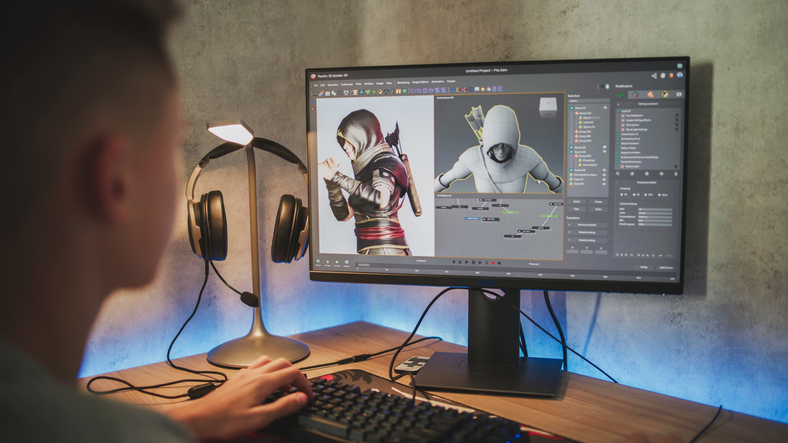The video game industry has grown from a niche pastime to one of the most powerful cultural and economic forces in entertainment. From immersive RPGs to addictive mobile puzzles, games are shaping how we relax, connect, and even learn. Behind every hit title is a team of talented game developers' creative technologists who bring imagination to life through art, code, and design.
As Canada cements its status as a global gaming powerhouse, the demand for game developers continues to rise. Game studios are on the lookout for new talent with the skills and vision to create engaging, innovative experiences for players around the world. Whether you are a high school graduate with a passion for gaming or a career changer looking for your next big adventure, now is the perfect time to explore the world of game development.
In this article, we will dive into what game development is, why it is in such high demand, how AI is reshaping the industry, and how programs like VCAD’s Game Development and Design Diploma are preparing students for success in this exciting field.
What is Game Development?
At its core, game development is the process of turning an idea into a playable, interactive experience. It blends storytelling, visual art, coding, sound design, psychology, and problem solving into one cohesive discipline. Think of it as filmmaking meets software engineering with a dash of magic.Game development is not just one job it is a collaborative effort between various specialists:
- Game Designers craft gameplay mechanics, player experiences, and level design.
- Game Programmers write the code that powers everything, from movement to complex AI behavior.
- 3D Artists and Animators bring characters, environments, and visual effects to life.
- Sound Designers and Composers create immersive audio worlds.
- QA Testers ensure that the game works as intended and is free of bugs.
From concept to launch, game development is a dynamic process that requires creativity, technical skill, and a lot of collaboration.
Demand for Game Developers in Canada
Canada is a global hub for game development, home to renowned studios like Ubisoft, EA, Relic Entertainment, and Behaviour Interactive. According to the Entertainment Software Association of Canada (ESAC), the country boasts over 900 active video game companies, employing tens of thousands of developers across provinces like British Columbia, Ontario, and Quebec. But here is where it gets exciting: despite a slight dip in the number of companies post pandemic, employment and salaries in the gaming sector are surging. In 2024 alone, the Canadian video game industry contributed $5.5 billion to the national GDP and reported a 21% increase in average annual salaries. Full time employment among game developers has risen to 86%, a clear indicator of industry maturity and job stability. This means that while smaller studios may ebb and flow with market pressures, the demand for experienced, creative, and tech savvy developers is only growing stronger.
Furthermore, the talent gap is widening. With more games being developed across more platforms from consoles to smartphones to virtual reality the industry needs more trained professionals to fill roles in programming, 3D modeling, animation, AI development, and more.
Use of AI for Game Development
Artificial Intelligence (AI) has long played a supporting role in video games from enemy pathfinding in classic arcade titles to basic decision making in strategy games. But in recent years, breakthroughs in generative AI and machine learning have begun to revolutionize the game development landscape, turning AI from a behind the scenes mechanic into a transformative creative partner. AI is now used in:
Next Generation NPCs and Game Logic
One of the most visible areas where AI is making an impact is in the creation of smarter, more adaptive non playable characters (NPCs). In the past, NPCs followed fixed routines or simple logic trees. Today, AI powered NPCs can analyze player behaviour, adjust their tactics in real time, and create lifelike, emotionally responsive interactions. This results in gameplay that feels more immersive, dynamic, and personalized.
In role playing games and simulations, AI systems are even capable of generating complex dialogue trees based on the player’s decisions making each player’s journey feel unique and responsive.
Procedural Generation and World Building
AI is also being used to generate entire game environments, from expansive landscapes to intricate dungeon systems. This technique, known as procedural generation, allows developers to create vast, detailed game worlds without manually designing every square inch. Games like No Man’s Sky and Minecraft have pioneered this concept, using AI algorithms to generate endless worlds with consistent logic and design. Now, even indie developers can build massive, engaging environments thanks to accessible AI tools that dramatically reduce time and resource costs.
Enhancing Art and Animation Workflows
For artists and animators, AI tools are streamlining what were once time-consuming tasks. Generative AI models can assist in:
- Creating base character models and concept art
- Enhancing textures and lighting effects
- Automating in between frames for smoother animation
- Predicting realistic physics and motion for character rigs
This does not mean AI is replacing artists instead, it amplifies their productivity and creative freedom, allowing them to spend more time refining the vision of a game rather than grinding through repetitive processes.
Personalizing the Player Experience
One of the most exciting uses of AI in gaming is its ability to personalize gameplay experiences. By analyzing real time player behaviour such as movement patterns, decision making, or in game purchases AI systems can:
- Adapt difficulty levels dynamically
- Recommend specific content or paths
- Tailor storylines based on play style
- Create unique quests or challenges suited to individual players
This personalization enhances player retention and engagement, helping developers better meet the expectations of a diverse and evolving gaming audience.
AI in Testing and Quality Assurance
Game development does not end with creation; it must also be rigorously tested to ensure quality. AI tools are now being employed to automate bug detection, stress testing, and optimization tasks that once required huge QA teams. These systems can simulate thousands of gameplay scenarios quickly, identify potential exploits or glitches, and even suggest fixes. The result? Higher quality games, faster releases, and fewer bugs on launch day a win for both developers and players. Despite all the buzz, it is important to note that AI is not a substitute for human creativity or ingenuity.
The heart of game development compelling storytelling, emotional design, and innovation remains a uniquely human strength. Instead, AI functions as a collaborative tool, enabling developers to offload repetitive tasks, gain insights from data, and experiment with bold innovative ideas.
The Growing Demand for Video Game Developers
Let us break down why demand for game developers is growing, both globally and here in Canada.
1. A Booming Industry
By the end of 2021, the video game market generated more than $180 billion USD in revenue and it is predicted that the global gaming market is set to reach over $268 billion USD by 2025. and continues to outpace traditional media sectors like film and music. Canada is a major contributor, with a vibrant ecosystem that supports indie creators, AAA studios, and everything in between.
2. Expansion of Platforms
Games are no longer confined to consoles and PCs. Developers are creating for mobile, VR/AR, cloud gaming, and even wearable tech. This platform diversity increases the need for developers with flexible, cross platform skills.
3. Rise of Esports and Streaming
Competitive gaming and streaming platforms like Twitch and YouTube have created entirely new entertainment markets. These platforms rely on engaging, replayable content fueling demand for developers who can build and maintain long term experiences.
4. Gamification and Beyond
Game mechanics are being used in education, healthcare, marketing, and training simulations, opening new doors for developers beyond traditional gaming. Companies and institutions are turning to game development principles to build apps, learning tools, and virtual simulations.
5. Diversity and Inclusion
As the gaming audience diversifies, there is a rising demand for games that reflect broader perspectives and developers from varied backgrounds. This inclusivity drive is pushing studios to hire talent from all walks of life, ensuring that the next generation of games resonates with more people.
Game Development and Design Diploma by VCAD
For those eager to enter this booming field, choosing the right education is key. While a four-year computer science degree is one route, many aspiring developers are turning to diploma programs that offer a faster, more hands-on approach. VCAD’s Game Development and Design Diploma is one such program, tailored specifically to meet the needs of the modern gaming industry. It is ideal for prospective students who want job ready skills without spending years in university.
Why VCAD?
- Hands On Projects: Students work on real world game development projects from day one.
- Industry Software Training: Learn tools like Unity, Unreal Engine, Blender, Maya, and more.
- Portfolio Development: Graduate with a professional portfolio that highlights your work to potential employers.
- Flexible Learning: Programs available online or in person in Vancouver and Calgary.
- Career Support: Access to internships, job placement assistance, and networking opportunities.
- Accelerated Timeline: Most students complete the program in less than two years.
The diploma balances the creative and technical sides of game development, from 3D modeling to AI scripting, storytelling, and gameplay mechanics. Whether you dream of building your own indie game or joining a major studio, VCAD’s diploma program helps you hit the ground running.
Bonus Read: Do You Need a Degree to Become a Game Developer?
Final Thoughts
The demand for game developers in Canada has never been stronger. As the industry continues to expand and evolve fuelled by technology, creativity, and global engagement so does the opportunity for new talent to make their mark.
You do not need a four-year degree to break into this exciting world. What you do need is passion, dedication, and the right training. VCAD’s Game Development and Design Diploma delivers all that and more, helping aspiring developers transform their love for gaming into a successful career.
So, if you have ever imagined your name in the credits of a video game, now is the time to make it happen. The industry is calling, and the next great game could be yours.
Ready to level up your future?
Learn more about VCAD’s Game Development and Design Diploma and start your journey today.














